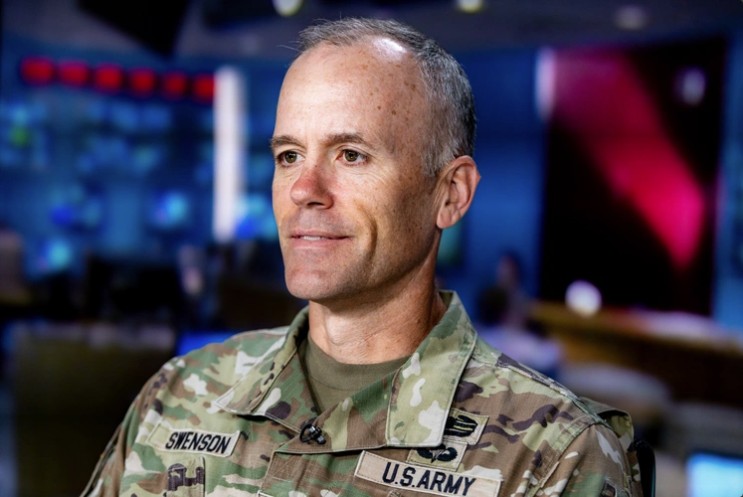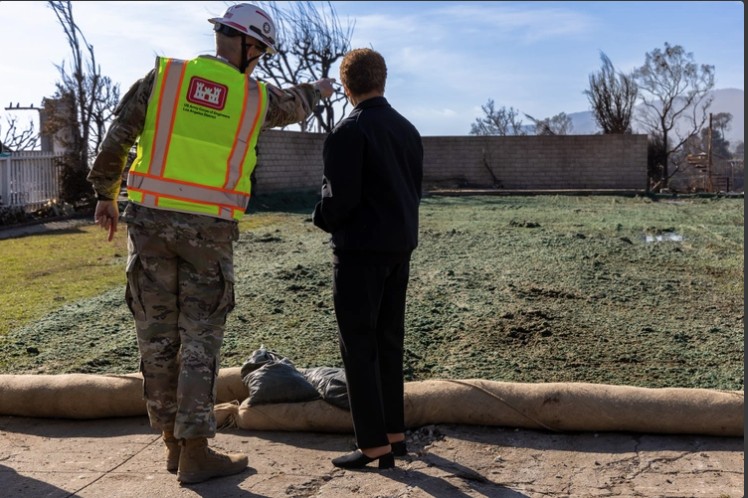Colonel Eric Swenson was assigned to Southern California in January to head the Army Corps of Engineers’ mission to cean the debris of homes and businesses destroyed by the Palisades and Eton Fires. Nearly 12,000 homes and businesses were destroyed in those fires on January 7, 8 and 9. Five months later, with the mission nearly complete, Swenson will depart on July 3.
Swenson, who lives in New Jersey, will leave to take over as the deputy commander of the North Atlantic Division of the Army Corps of Engineers, which is based in Brooklyn.
The Colonel told CTN on June 18 that ACE will be substantially completed with this mission by July, unless they receive abatement properties from the city and county. (Those are properties that hadn’t been cleared by the June 30 deadline imposed by the City of Los Angeles). Eaton is also nearly finished and work at both locations will be completed at about the same time.
“We have kept to our initial budget for this mission,” Swenson said. “We estimated removing 4.5 M tons of debris and so far, are under that total.”
He was asked when Temescal Canyon Road would reopen. At the height of debris removal, that road had been turned into a steel/concrete recycling site for ACE and closed to traffic.
“There are no more recycling operations on Temescal and that road will be turned back over to the City in August,” Swenson said, and added, “The city has done some repair work on a section of the road we were not using.” A month before the fires the downhill lanes of Temescal started “leaking” water and the road developed a sink hole.
Swenson, who was based in Minnesota, had been sent to Lahaina in January 2024 to oversee debris removal after those deadly fires destroyed more than 2,200 buildings and killed more than 100. The Army Corps finished that mission at the end of August 2024. Four months after he returned to the mainland, the California fires happened, and he was sent here.
The Colonel was asked how this disaster cleanup compared to Lahaina. “They are similar in the suffering,” he said. “LA is just eight times larger. Like Maui, this mission was an outstanding example of how federal, state, and local leaders can work well together to deliver much needed assistance to communities that are suffering a terrible tragedy.”
By working with the Lahaina wildfire recovery, Swenson said that he learned a lot of lessons that he applied to this disaster, including building trust. “That trust helped survivors sign up to our program early.”
At a venue held at Santa Monica College shortly after the fires, Swenson promised that the Corps would move at the speed of trust. “I meant it,” he said.
The Colonel handed his cell phone number to people who asked for it. “I did give my number to many and would do it again,” he said. “I never expected to be 85% complete in four months. It would not have been possible without trust.” One of the first homes to have debris removal was on DePauw on February 16.
With so many people grieving about the loss of their property and the frustration/disbelief individuals felt over the fire, Swenson and ACE often became the targets of vented anger. He was asked how they dealt with it.
“Everyone mourns and grieves differently,” the Colonel said. “We bring compassion to every interaction and seek to help people who are dealing with loss.
“We start a conversation by asking how the survivor is doing and express sympathy for their loss,” he said. “We provide consistent fact-based answers to questions and follow up with all inquiries.
“I insist that all my teammates, both USACE employees and our contractors listen first and listen with the intent to understand,” Swenson said. “Communication is crucial when helping people in crisis. We do not take anger personally. And we strive to deliver on our promise.”
He was asked the toughest thing about this particular mission. “The hardest part of any deployment for me is being away from my wife and three daughters,” Swenson said and acknowledged that it is tough not to absorb the grief of survivors, but “I try to help them focus on the end state, which is being back in a new home in their community.”
Swenson said, “It is an absolute honor to be in LA walking shoulder to shoulder with survivors as they recover from the devastating wildfires that struck this county on January 7. Fires are terrible but they do help forge new friendships, friendships that will last a lifetime.”



Big thank you Col Swanson’s leadership. Wish LA City leadership learns on “delivering what it promised, like expedited permitting, or conne ting with survivors in deploying helpful resources, rather than boasting on accomplishments.
Sue, we are planning a community farewell for Col Swenson on July 2nd, from 8:30-10am at the Village Green along with Sue and PPCC, as well as Larry and Pali Strong. Please tell Palisadians to come by and say a warm farewell!